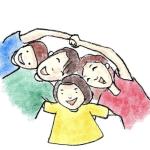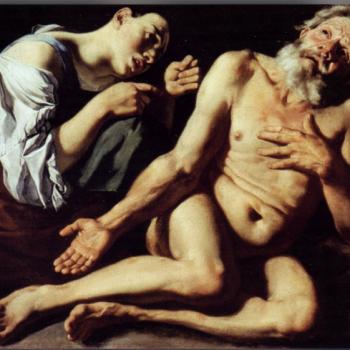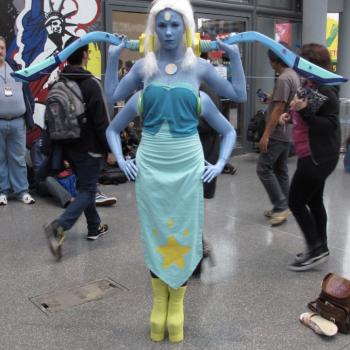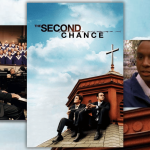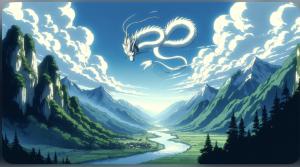
AI-Generated Fanart representing the character “Haku” from Miyazaki’s work “Spirited Away”. Wikimedia Commons
Gender roles in a Jewish household
Growing up in Midwestern America, as a young girl who grew up in a solely Jewish based sense of identity, it is easy to find the roles of gender a bit muddled. Many would relay their astonishment at my heritage. I remember so strikingly the time in class as we were discussing holidays, the teacher signaled me out to explain Hannukah to the class. It was also easier to remain the class clown and have my kibbitz with the other students, than to truly feel more separated from the world. As odd as it was, I saw the role of women as the boss, and the head of the household, and the men would merely be the Mensch, and nod along willingly to whatever my mother, Baba, or Great Aunt would say.
This is something I didn’t see until I was much older—represented in ways that I felt I could relate to. Until these films, I felt like my family was very odd for having females as the head of the house. It wasn’t until Vocal, an online writer’s community, that I really felt acceptance and understood for the way I felt. Especially the fact that I always wrote in the male perspective and never female(I just inherently did this, I never understood why). On Vocal, I feel like the roles are not muddled—they are defined and I feel seen and accepted and found in a lot of ways by amazing writers and staff who can help me along my path as a growing writer.
Hayao Miyazaki And his ingenious ways of conveying gender
The role of males in Hayao Miyazaki’s films have been one of passivity, supportive, and at times a bit histrionic, with the male counterparts of the main female characters being portrayed as more emotionally sensitive and a secondary role to the plot.
1. Howl’s Moving Castle
In Howl’s Moving Castle, the most life altering things happen to our main character, Sophie, yet in a small bout of shock, she snaps out of it and accepts her new, older matronly form and sets out to find an acceptable new situation for herself. Howl goes through what could be called deep stages of melancholia, where he’s constantly running away from his responsibilities, his choices, and in what could be called a metaphor for one of the last stages of grief, before acceptance, he transforms into something breathtakingly beautiful yet, monstrous in his reflective, avoidant gaze. One transformation is by a curse, the other is almost seen as a self afflicted torment, that of which can be seen as important when Sophie tries to also Snap Howl out of his torment, and it shows a deep sense of empathy that they have for each other.
2. Darren Affronksy’s Black Swan
Howl’s slow transformation is similar to the final transformation of Nina in Darren Affronksy’s Black Swan; dark, aggressive, and emerging into shadow instead of light, male instead of female. Her once demure and calm nature is twisted into what is expected out of the light of femininity into dusky, stalking masculinity.
3. Spirited Away
It is a completely opposite pattern in Spirted Away, as Chirio has a silent type of strength that is autonomous, with the other characters being a support to her journey as she is endurant of her circumstances with fearless abandon. No Face takes on a ludicrous expression of gluttony and self absorption that is non gendered in a sense that he takes on many personas… with a literal absorption of other people. His pride and attention seeking behavior suggests more of a human type of fervor, but laced with malice when the attention is not received. Chirio diverts the attention away from her in the most insanely intense and original way—by provoking the true reason behind the attention and by extension healing No Face, to expel the fear of loneliness in a scene that is uncomfortable yet enlightening of his character. The way the male and female roles switch and meld together in these films show us the way we ultimately should look at these stories… not merely as Male and female problems, but as Swedish Film Director Ingmar Bergman has quoted, human problems.
4. Fantastic Beasts and Where to find them
The passivity of some of these Male roles forsakes the way other forms of media portray men, as the Herculian hero that has succeeded all others in muscle and heart, with the task to save fair maiden from destruction and demise… but I argue it shows something we all know to he true but disregard: men can be supportive and just as important being the way to a women’s destiny, rather than being her destiny, or to interfere in it, but to merely be there and to provide some semblance of trust in a strange new world. This is true also in Fantastic Beasts, where the main character is a Male, but his character is of sensitivity and warmth, intelligence and patience. It’s in the passive nature of his personal expression that gives off a radiant strength to others around him, and in a real way, is something deeply important to not only our innate humanity, but to his own identity as a man. It’s often we find ourselves ingrained in our roles we perceive others want us to be in, as a society or in general, and with these things being more pumped up in society more than ever, a hyper masculine persona with pomposity, a fear of losing, and a general hubristic desire to overwhelm the masses with bulging muscles–real or perceived, is palpable every where in the mainstream media. We need to find a way to improve on the role of passivity, and to show it’s not a weakness, but a strength.
5. Whiplash
In the 2014 drama Whiplash, there’s always the urgency to win, to best every other competitor, and to always improve one’s ability so deftly, to the brink of losing your sanity, and ultimately, your own sense of identity.
It may not be a question of hyper masculinity, rather, a sense of unending pride and insecurity that most people can understand, even with such an extreme example. To not look weak is the truest sense of toxicity in gender roles, is to extrapolate those positive traits into an inhuman and even monstrous figure, that looks like something out of The Cabinet of Dr. Caligari.
6. Grave of the Fireflies
Another example of pride and fear colliding with the most common role imposed of a man, to take care of others to the detriment of themselves, is in The Grave of the Fireflies. As an understated and sadly misunderstood film, its main focus is that of a family trying to survive the effects of war and death, famine and poverty, wherein two siblings have to make it by themselves. The most tragic flaw of the older brother is that of pride-that he refuses help from others, and tries to deal with heartbreaking, difficult adult problems by himself, simply because it’s in his mind that he needs to do it..to be tough and a man, and take care of things without complaint. These toxic and tragic subtleties are extremely effective in the narrative that ultimately shows that pride is in, of itself, an extremely powerful thing that can destroy others, and the very nature of the will to survive.
We should implement a different approach to passivity, and not to minimize our differences as negative, but as something great, that can, either support and trust, lead us into a new golden age of art, cinema, religion & Faith, and even, our relationships with one another.



